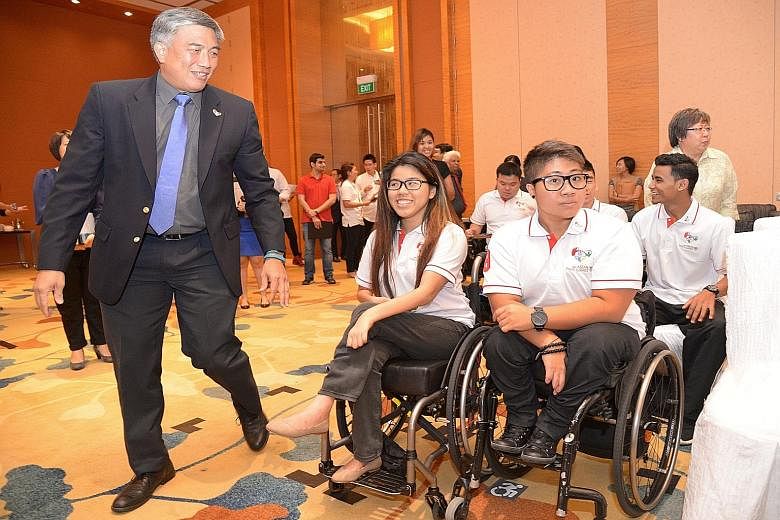Public trains will be the primary mode of transport for athletes during December's Asean Para Games, to take them from the Games Village at Marina Bay Sands (MBS) to the Singapore Sports Hub and vice versa.
The unconventional arrangement - which has drawn some criticism and could see athletes with disabilities jostling for spots on the MRT with other commuters, especially during rush hour - was planned to give athletes and officials ease of mind when it comes to travelling.
But perhaps just as important, the Singapore Asean Para Games Organising Committee (Sapgoc) added, is the opportunity to promote "a spirit of inclusiveness" where commuters and athletes with disabilities will share common space.
Said Sapgoc chairman Lim Teck Yin: "This was part of the overall concept of the Games from the start. The community with disabilities was consulted and it, as well as the Asean Para Sports Federation and the Singapore Disability Sports Council, welcomed the idea."
All 3,000 athletes and officials from 11 countries will be housed at MBS. The hotel is linked to the Circle Line's Bayfront station, three stops away from Stadium station.
Organisers say travel times will be shorter by train than by chartered buses. But while trains will be the preferred mode of transport to the Sports Hub, chartered transport will still be provided for athletes competing at other venues around the island. Athletes and officials taking the train will be given Cepas cards with stored value and have chaperones accompanying them to competition venues.
However, the unorthodox move - made known to team managers during a meeting with organisers last week - has led some to question its practicality, particularly for athletes with mobility and visual disabilities.
With eight of the 15 sports on offer being played at the Hub, some athletes fear they might be late for their events if the trains are crowded or their equipment cannot fit on board.
Asian Para Games gold medallist sailor Jovin Tan noted that, as hosts, Singapore should ensure all athletes are rested to shine on the regional stage. "Instead, we could be worrying over how to get to the venue, or how we will return to the hotel sweaty and tired after competing, and possibly jostling for space with office crowds."
A Philippine Paralympic official, who declined to be named, expressed concern that athletes who travel separately from their contingent could get lost. "We don't need missing or late athletes on top of the usual issues we have to deal with during major sporting events."
Others were displeased that the Games - now into its eighth edition but which Singapore is hosting for the first time - will not have a full-fledged shuttle bus system as seen during June's SEA Games.
In his statement, Mr Lim said shuttle buses will be provided to those who are "unable to take the Circle Line". But exactly who falls under this classification was not defined nor explained.
Mr Baey Yam Keng, Parliamentary Secretary for Culture, Community and Youth, said the Games serve a larger purpose - that of assimilating and integrating the public with athletes with disabilities. "The idea of inclusiveness is something we should be open about. If the athletes are seen in public, we can raise awareness of the Games and expose them to the athletes' way of life."
- SEE SPORT


